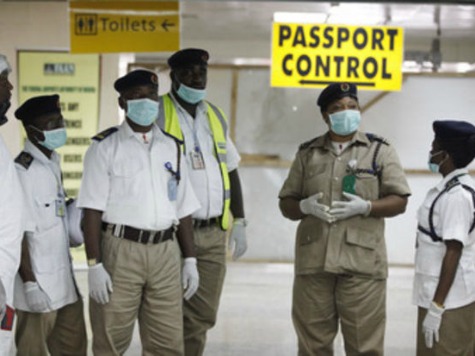With few resources to treat the infected, and even fewer to keep the virus from spreading, the governments of Liberia and Sierra Leone have begun isolating large swaths of the country where the virus has spread uncontrollably, attempting to isolate the urban capitals from the rural disease.
BBC reports that soldiers in Monrovia, the capital of Liberia, are sealing off all city borders. Not only are those with Ebola symptoms being prevented from entering the city, but the British outlet reports that the blockade is preventing “people from western regions affected by the Ebola outbreak from entering the capital,” despite their apparent health. The regions affected are Grand Cape Mount and Bomi, the areas with the greatest number of Ebola victims to date.
As Ebola virus symptoms can take up to 21 days to manifest in an infected patient, the Liberian government is taking no chances. “The government and people of Liberia require extraordinary measures for the very survival of our State and for the protection of the lives of our people,” President Ellen Johnson Sirleaf said in a speech announcing the new measures and an official declaration of a “state of emergency” in the country. Sirleaf warned that, to combat the disease, she would have to implement the “suspension of certain rights”–first and foremost, that of free travel within the country.
The government of Sierra Leone is taking the reverse approach to attacking the virus, blockading rural areas so that those affected cannot get out, rather than protecting the cities so that rural villagers cannot get in. Reuters notes that the head of police of Eastern Sierra Leone announced that the region would “establish a complete blockade” of the districts of Kenema and Kailahun. Through a series of 16 checkpoints, the government will ensure that, for the next 50 days, no one in the villages will be able to leave.
The fear of Ebola spreading is not limited to the nations most devastated by it. Nigeria, for example, has diagnosed a relatively small number of six confirmed cases, but the nation’s health minister has declared it a “national emergency,” and Nigeria has begun to scramble to acquire a sufficient number of isolation tents and medical equipment for the potential outbreak. In Nigeria’s National Assembly, the legislators refused to shake hands, fearing that any one of them had come into contact with an Ebola carrier.
Even neighboring Senegal, which has not documented a single case of Ebola as of press time, has stated its fears that the virus will hit. President Macky Sall, in the United States for a pan-African summit with President Obama, described the virus as a “threat to humanity,” warning against viewing the virus as a regional threat only. That his nation had not yet seen a case of it did not deter his concern: “I am a neighbor of Guinea. I’m almost a neighbor of Sierra Leone. We are in the crucible. In the eye of the cyclone.”
With the World Health Organization currently deliberating a response to the crisis, African countries are working around the clock to combat the disease on their own until more medical aid can arrive at their doors. The viral outbreak shows no signs of abating, and now–with cases either confirmed or believed to be in nations as diverse as the United States, Spain, and Saudi Arabia–the world has tuned in to find a resolution to this crisis.

COMMENTS
Please let us know if you're having issues with commenting.